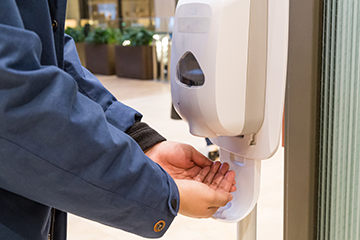
Ethanol Recovery Systems During the COVID-19 Era
Learn how ethanol recovery systems were implemented for high-volume retail waste and how retail chains took advantage of these recovery programs.Byline: BTB Editor
August 10, 2024 / Time to read: 5 minRetailers experienced unprecedented shifts in shopping habits amidst the pandemic, with a dramatic surge in online shopping and a consequent increase in returns. Despite the convenience of home delivery, many customers still opted to return unwanted, damaged or mislabeled items in-store for refunds, leading to a significant uptick in returned merchandise. However, in accordance with federal, state and local guidelines, many of these items could not be restocked or resold and instead needed to be disposed of compliantly. Additionally, as stores accepted returned items that were never inventoried at their physical locations, they faced a surge in RCRA waste volume, a phenomenon not previously encountered with pre-pandemic shopping habits.
Among the trending waste items returned to retailers for disposal in 2020, perfume, alcohol and hand sanitizer emerged as particularly challenging due to their product and packaging weight and chemical composition. These products contain ethanol, an RCRA hazardous chemical. Fortunately, retailers had an innovative solution at their disposal to manage these increasingly common items compliantly: ethanol recovery.
RCRA Waste Generator Categories
As part of the Resource Conservation Recovery Act (RCRA), the EPA regulates how much hazardous waste organizations produce. Each company is
There are three categories of RCRA Waste generation:
- Very small quantity generators (VSQGs): less than 100kg of acutely hazardous waste per month
- Small quantity generators (SQGs): 100kg to 1,000kg of acutely hazardous waste per month
- Large quantity generators (LCGs): more than 1,000kg of acutely hazardous waste per month
The more hazardous waste — like ethanol-containing products — you generate, the more complex the requirements. That’s a compelling reason to recover as much ethanol as possible — but many companies struggled with unexpected ethanol waste during COVID-19.
Our Ethanol Recovery Solutions
US Ecology, a recent Republic Services acquisition, had provided ethanol recovery solutions to all customer segments for over a decade. However, retailers specifically benefitted from this alternative disposal method in 2020 when in-store product returns skyrocketed.
The process begins in-store when businesses identify and segregate products containing ethanol from other RCRA hazardous waste. We then list these products on a bill of lading for reclamation rather than on a hazardous waste manifest. By employing this approach, retailers excluded high volumes of heavy waste from solid waste and RCRA regulations, thereby reducing their overall generator status. This benefited the retailers by simplifying regulatory compliance and helped them avoid additional paperwork, scrutiny, fines and fees.
Our ethanol recovery system consolidates waste from multiple retail locations at
Ethanol Recovery Success
Several national retail chains that took advantage of our ethanol recovery program experienced a significant reduction in waste. For example, one large national retailer eliminated an average of 130 pounds of waste per store per retail waste pickup for alcohol or perfume, resulting in an annual removal of at least half a million pounds from their RCRA waste generator status.
Furthermore, retailers exploring in-house hand sanitizer manufacturing to combat COVID-19 faced challenges with failed batches that were not approved by regulatory agencies for public sale due to labeling issues or unproven efficacy against the virus. These failed batches, containing ethanol-based products, required safe disposal to protect human health and the environment. Leveraging the ethanol recovery program, one retailer alone removed over 75,000 pounds of waste from their generator status in approximately six months.
Need a partner to recover ethanol waste and reduce your RCRA generator status? Learn more about Republic Services
